![Supreme Court documents regarding the Amistad case [via Fold3]](https://www.newspapers.com/topics/wp-content/uploads/Amistad-e1550792825707-300x227.jpg)
Supreme Court documents regarding the Amistad case [via Fold3]
Background
In 1839, a group of Africans from Sierra Leone were abducted and shipped to Havana, Cuba, to be sold and enslaved. When they arrived in Cuba, two Spanish plantation owners, Pedro Montes and Jose Ruiz, illegally purchased 53 to be enslaved on their Caribbean plantation. They loaded the Africans aboard the Cuban schooner Amistad.
Rebellion on the Amistad
While sailing through the Caribbean, the captured Africans organized a revolt. One of them, Sengbe Pieh (also known as Joseph Cinque), freed himself and loosed others. They killed the captain and the ship’s cook, seized the ship, and ordered Montes and Ruiz to sail to Africa.
Capture by the United States
Under the guise of heading toward Africa, Montes and Ruiz sailed the ship north instead. On August 26, 1839, it dropped anchor off the tip of Long Island, where it was discovered by the revenue cutter USS Washington. Thomas R. Gedney, commanding officer of the Washington, ordered his men to disarm the Africans and capture everyone. They were all transported to Connecticut, where officials freed the Spaniards but charged the Africans with murder on the high seas.
Court Case
The murder charges were eventually dismissed, but the plantation owners, the government of Spain, and Gedney all claimed some sort of compensation. The case made it all the way to the U.S. Supreme Court, which ruled in favor of the Africans and ordered their immediate release.
Aftermath
Abolitionists who had supported the Africans’ cause raised funds to return them to Africa. On November 26, 1841, nearly three years after their abduction, the surviving Africans departed New York City bound for Sierra Leone.
Learn more about the Amistad Case through historical newspapers from our archives. Explore newspaper articles, headlines, images, and other primary sources below.
Articles and Clippings about the Amistad Case
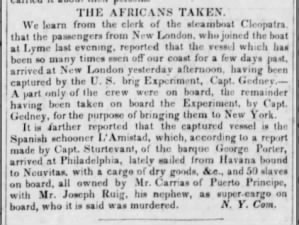 Amistad slave ship is captured by Lt. Thomas Gedney and brought to New London, Connecticut Thu, Aug 29, 1839 – Page 2 · The Long-Island Star (Brooklyn, Kings, New York) · Newspapers.com
Amistad slave ship is captured by Lt. Thomas Gedney and brought to New London, Connecticut Thu, Aug 29, 1839 – Page 2 · The Long-Island Star (Brooklyn, Kings, New York) · Newspapers.com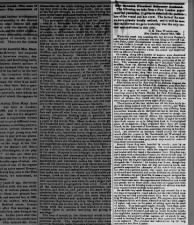 Account of the uprising on the Amistad slave ship and its capture by the US Revenue Cutter Service Fri, Aug 30, 1839 – 2 · New York Daily Herald (New York, New York, United States of America) · Newspapers.com
Account of the uprising on the Amistad slave ship and its capture by the US Revenue Cutter Service Fri, Aug 30, 1839 – 2 · New York Daily Herald (New York, New York, United States of America) · Newspapers.com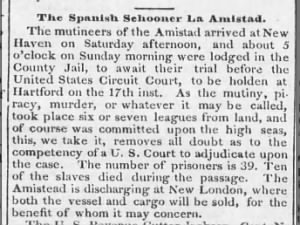 Africans on board the Amistad are held in a Connecticut jail to await trial Wed, Sep 4, 1839 – 2 · The National Gazette (Philadelphia, Pennsylvania, United States of America) · Newspapers.com
Africans on board the Amistad are held in a Connecticut jail to await trial Wed, Sep 4, 1839 – 2 · The National Gazette (Philadelphia, Pennsylvania, United States of America) · Newspapers.com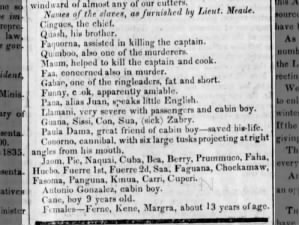 Newspaper lists the names of the Africans taken from the Amistad Thu, Sep 5, 1839 – Page 2 · The Long-Island Star (Brooklyn, Kings, New York) · Newspapers.com
Newspaper lists the names of the Africans taken from the Amistad Thu, Sep 5, 1839 – Page 2 · The Long-Island Star (Brooklyn, Kings, New York) · Newspapers.com Editorial: Africans on the Amistad should not "be delivered up to the Spanish authorities" Thu, Sep 5, 1839 – Page 2 · The Evening Post (New York, New York, New York) · Newspapers.com
Editorial: Africans on the Amistad should not "be delivered up to the Spanish authorities" Thu, Sep 5, 1839 – Page 2 · The Evening Post (New York, New York, New York) · Newspapers.com Newspaper publishes a legal scholar's opinion on the laws involved in the Amistad case Fri, Sep 6, 1839 – Page 2 · The Evening Post (New York, New York, New York) · Newspapers.com
Newspaper publishes a legal scholar's opinion on the laws involved in the Amistad case Fri, Sep 6, 1839 – Page 2 · The Evening Post (New York, New York, New York) · Newspapers.com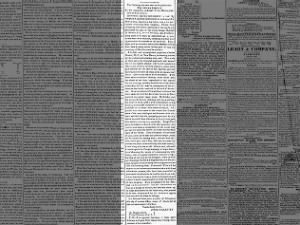 Reported conditions of the Africans detained in Connecticut after being taken from the Amistad Fri, Sep 6, 1839 – Page 2 · The Evening Post (New York, New York, New York) · Newspapers.com
Reported conditions of the Africans detained in Connecticut after being taken from the Amistad Fri, Sep 6, 1839 – Page 2 · The Evening Post (New York, New York, New York) · Newspapers.com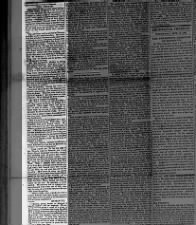 Letter to the editor arguing Africans on the Amistad were not murderers or pirates Wed, Sep 11, 1839 – Page 2 · The Rochester Freeman (Rochester, New York) · Newspapers.com
Letter to the editor arguing Africans on the Amistad were not murderers or pirates Wed, Sep 11, 1839 – Page 2 · The Rochester Freeman (Rochester, New York) · Newspapers.com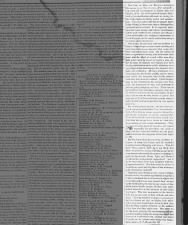 Anti-abolitionist editorial against the arrest of two surviving Spaniards on the Amistad Sat, Nov 23, 1839 – 1 · The Democrat (Huntsville, Alabama, United States of America) · Newspapers.com
Anti-abolitionist editorial against the arrest of two surviving Spaniards on the Amistad Sat, Nov 23, 1839 – 1 · The Democrat (Huntsville, Alabama, United States of America) · Newspapers.com "Letter from John Quincy Adams, respecting the captured Africans of the Amistad" Mon, Dec 30, 1839 – 2 · Hartford Courant (Hartford, Hartford, Connecticut, United States of America) · Newspapers.com
"Letter from John Quincy Adams, respecting the captured Africans of the Amistad" Mon, Dec 30, 1839 – 2 · Hartford Courant (Hartford, Hartford, Connecticut, United States of America) · Newspapers.com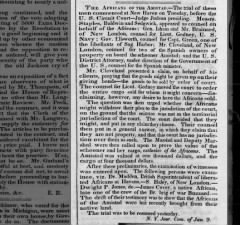 Amistad trial begins in US District Court in Connecticut Fri, Jan 10, 1840 – 2 · Hartford Courant (Hartford, Hartford, Connecticut, United States of America) · Newspapers.com
Amistad trial begins in US District Court in Connecticut Fri, Jan 10, 1840 – 2 · Hartford Courant (Hartford, Hartford, Connecticut, United States of America) · Newspapers.com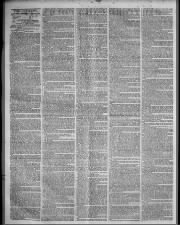 Excerpt from the ruling in the Amistad case by Judge Judson of the US District Court Thu, Jan 16, 1840 – 2 · Hartford Courant (Hartford, Hartford, Connecticut, United States of America) · Newspapers.com
Excerpt from the ruling in the Amistad case by Judge Judson of the US District Court Thu, Jan 16, 1840 – 2 · Hartford Courant (Hartford, Hartford, Connecticut, United States of America) · Newspapers.com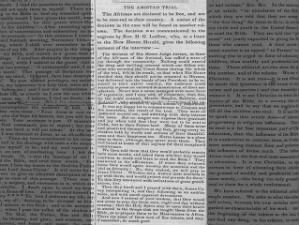 Written account of the reactions of the Africans from the Amistad to the District Court ruling Wed, Jan 22, 1840 – 2 · Vermont Chronicle (Bellows Falls, Vermont, United States of America) · Newspapers.com
Written account of the reactions of the Africans from the Amistad to the District Court ruling Wed, Jan 22, 1840 – 2 · Vermont Chronicle (Bellows Falls, Vermont, United States of America) · Newspapers.com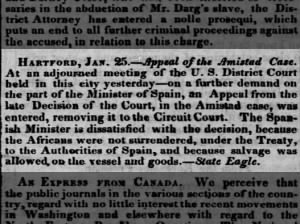 District Court's Amistad ruling is appealed, and case is sent to Circuit Court Fri, Jan 31, 1840 – Page 3 · The Liberator (Boston, Suffolk, Massachusetts) · Newspapers.com
District Court's Amistad ruling is appealed, and case is sent to Circuit Court Fri, Jan 31, 1840 – Page 3 · The Liberator (Boston, Suffolk, Massachusetts) · Newspapers.com John Quincy Adams is engaged as senior counsel defending the Africans in the Amistad case Tue, Nov 17, 1840 – 1 · The St Johnsbury Caledonian (St. Johnsbury, Caledonia, Vermont, United States of America) · Newspapers.com
John Quincy Adams is engaged as senior counsel defending the Africans in the Amistad case Tue, Nov 17, 1840 – 1 · The St Johnsbury Caledonian (St. Johnsbury, Caledonia, Vermont, United States of America) · Newspapers.com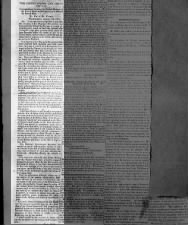 Letter showing the British government's position on the Amistad case Fri, Mar 12, 1841 – Page 2 · South-Western Farmer (Raymond, Hinds, Mississippi, United States of America) · Newspapers.com
Letter showing the British government's position on the Amistad case Fri, Mar 12, 1841 – Page 2 · South-Western Farmer (Raymond, Hinds, Mississippi, United States of America) · Newspapers.com US Supreme Court ruling in case of United States v. The Amistad Mon, Mar 22, 1841 – 2 · Hartford Courant (Hartford, Hartford, Connecticut, United States of America) · Newspapers.com
US Supreme Court ruling in case of United States v. The Amistad Mon, Mar 22, 1841 – 2 · Hartford Courant (Hartford, Hartford, Connecticut, United States of America) · Newspapers.com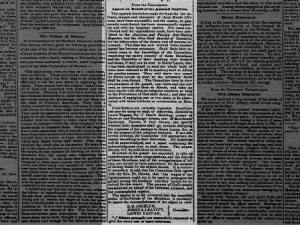 Group seeks donations to fund return trip to Africa for the Africans from the Amistad Fri, Oct 8, 1841 – Page 2 · The Liberator (Boston, Suffolk, Massachusetts) · Newspapers.com
Group seeks donations to fund return trip to Africa for the Africans from the Amistad Fri, Oct 8, 1841 – Page 2 · The Liberator (Boston, Suffolk, Massachusetts) · Newspapers.com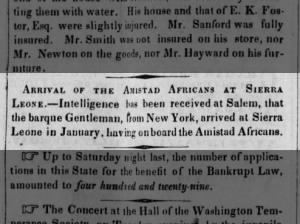 Africans from the Amistad return to Africa via Sierra Leone Thu, Mar 10, 1842 – 2 · Hartford Courant (Hartford, Hartford, Connecticut, United States of America) · Newspapers.com
Africans from the Amistad return to Africa via Sierra Leone Thu, Mar 10, 1842 – 2 · Hartford Courant (Hartford, Hartford, Connecticut, United States of America) · Newspapers.com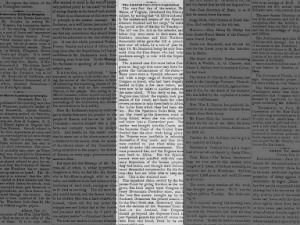 Bill is introduced in 1858 to "indemnify the masters and owners of the Spanish schooner Amistad" Fri, Dec 17, 1858 – Page 2 · The Fremont Weekly Journal (Fremont, Sandusky, Ohio) · Newspapers.com
Bill is introduced in 1858 to "indemnify the masters and owners of the Spanish schooner Amistad" Fri, Dec 17, 1858 – Page 2 · The Fremont Weekly Journal (Fremont, Sandusky, Ohio) · Newspapers.com